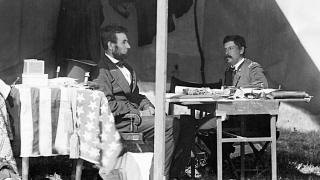May 29—Memorial Day is not about choosing between celebrating a day off to eat hog dogs or feeling sad for a moment about those who gave their lives for a cause. Abraham Lincoln, in his First Inaugural address, best captured how memorial days for those who fought for the country actually works, even as the country faced the outbreak of civil war: “The mystic chords of memory, stretching from every battlefield and patriot grave to every living heart and hearthstone all over this broad land, will yet swell the chorus of the Union, when again touched, as surely they will be, by the better angels of our nature.”
Some reverberating echoes of Lincoln’s statecraft include the following: It is important to remind ourselves that we are not as bad a people as our present circumstances might suggest we are; and that, in the conscious effort to recall for ourselves what has gone into the formation and existence of the country, we may be transformed into the persons that we should be. This can happen because the action of memory works as surely as does the power of music.
On that note, since today’s Memorial Day occurs on the birthday of President John F. Kennedy, also a veteran, and one who truly died in the service of this country, it is worth studying his keynote address on the intimate role of culture for the highest level of politics. He spoke in 1962, as part of the effort to establish a national cultural project, what would become the JFK Center for the Performing Arts.
“To the extent that artists struggle to express beauty in form and color and sound, to the extent that they write about man’s struggle with nature or society, or himself, to that extent they strike a responsive chord in all humanity. Today, Sophocles speaks to us from more than 2,000 years.” Despite tensions between Russia and the U.S., Russians read Mark Twain and Edgar Poe, and Americans read Tolstoy and Dostoyevsky, and both gain “insight into the shared problems of the human heart. Thus today, as always, art knows no national boundaries.”
“Genius can speak at any time, and the entire world will hear it and listen. Behind the storm of daily conflict and crisis, the dramatic confrontations, the tumult of political struggle, the poet, the artist, the musician, continues the quiet work of centuries, building bridges of experience between peoples, reminding man of the universality of his feelings and desires and despairs, and reminding him that the forces that unite are deeper than those that divide.
“Thus, art and the encouragement of art is political in the most profound sense, not as a weapon in the struggle, but as an instrument of understanding of the futility of struggle between those who share man’s faith. Aeschylus and Plato are remembered today long after the triumphs of imperial Athens are gone. Dante outlived the ambitions of 13th century Florence. Goethe stands serenely above the politics of Germany, and I am certain that after the dust of centuries has passed over our cities, we, too, will be remembered not for victories or defeats in battle or in politics, but for our contribution to the human spirit… If we can make our country one of the great schools of civilization, then on that achievement will surely rest our claim to the ultimate gratitude of mankind.”
JFK added that “a great democratic society” has “a special responsibility to the arts, for art is the great democrat calling forth creative genius from every sector of society…. The mere accumulation of wealth and power is available to the dictator and the democrat alike. What freedom alone can bring is the liberation of the human mind and spirit which finds its greatest flowering in the free society.” In essence, we can’t have a democracy without the arts bringing out the best in mankind.
It’s worth remembering a good President. Make America good again.
Step One: Sign and circulate the Schiller Institute’s “Urgent Appeal by Citizens and Institutions from All Over the World to the (Next) President of the United States!”






